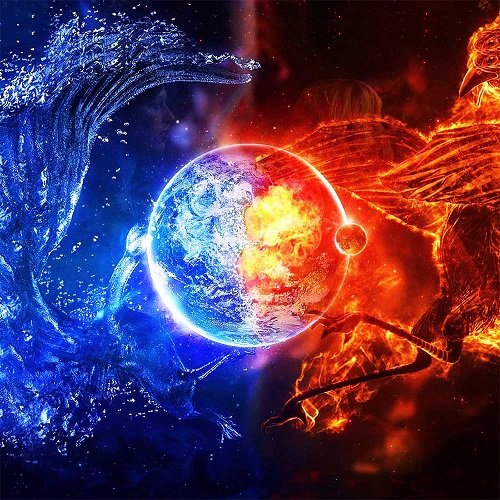FWP:
For once I agree with Nazm. There's just too much going on in this verse, and the various domains of imagery aren't-- and perhaps couldn't really have been-- pulled together into a properly tight state of connection.
Just look at the domains: the commercial ('coin'); the anatomical ('wound', 'heart', 'tonguelessness'); the martial ('wound', 'guard', 'hidden', 'ambush/blind'); that of temperature ('flame', 'coldness', 'tonguelessness' since flame has a tongue). Even for Ghalib, it would be a tall order to meld all these domains together in a way that would feel inevitable and indissoluble. The 'flame' is acting as a 'guard' of the 'coin' of a 'wound'?
By the time we've struggled to put the whole thing into
a kind of obscure, not very compelling assertion, we are likely to feel let down-- like someone who has just put together a complex but not captivating jigsaw
puzzle. Or, of course-- to change metaphors-- it could be that a bus has just
pulled out, and I missed it. With a poet like Ghalib it's never safe to write
things off in more than a provisional way.

Nazm:
He says, the flame is guarding the wound of my heart, that is, it does not permit it to become cold. If it did not have this power, then coldness/grief, in the guise of tonguelessness, would come hiddenly, like a thief, and steal this gold coin and run off. The simile of flame for a tongue is well-known. So the the non-guarding of the flame is that very tonguelessness, and its fruit is coldness/grief: if the flame would not guard it, then the wound of the heart would become cold/melancholy, and the thief of coldness would would steal it away by means of tonguelessness. In this verse he has used for the wound the simile of a gold piece, that is, he has given rupees and gold pieces.
Persian-speakers are of the opinion that the wound of the heart is a round thing, and in it there is a glittering, and a burning, and for that very reason they use 'sun of the wound' and 'dirham of the wound' and 'flame of the wound' and so on. In Urdu poetry, this theme has been taken from Persian poetry alone. In the same way that they consider that a sigh is a long thing, in which there is flame, and smoke too. Longing is some living thing, that sometimes is murdered within the heart itself, and sometimes buried alive with the lover; sometimes it lights a fire and sits nearby it. In short, when the wound of the heart became a gold coin, then the flame, because its eye remains open all night long, is its guardian. And although the author has not referred to coldness as a thief, he has described its deed as like that of thieves-- that is, it remains on watch to steal wealth, as if he had depicted a thief, who would be hidden in the ambush/blind of tonguelessness.
All these similes are extremely delicate/refined [la:tiif], but if you look at the fruit/result of the verse, then it's nothing at all.
In jo nah naqd-e daa;G both successive parts have the flaw of mutual repulsion [tanaafur]. [A discussion of the tongue-twister quality of this phrase.] (187-88)
== Nazm page 187; Nazm page 188